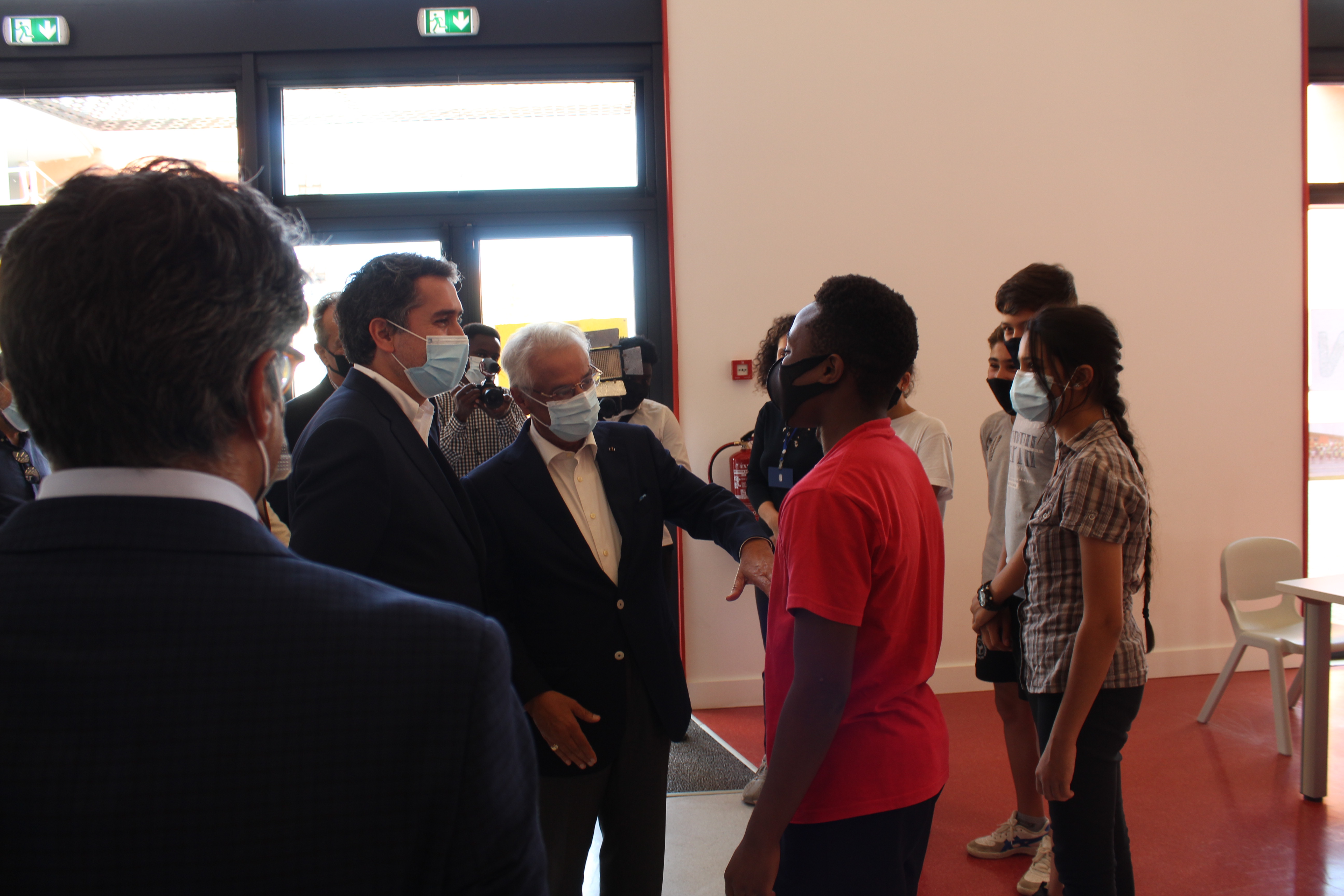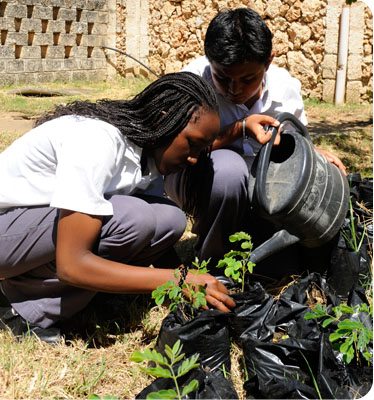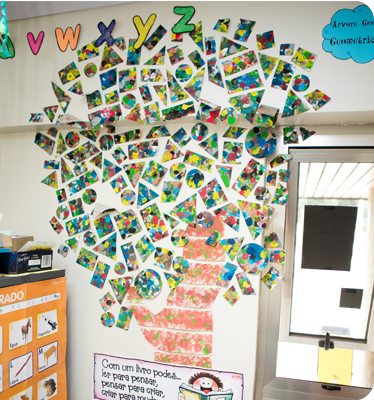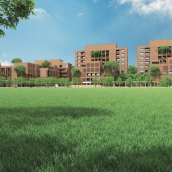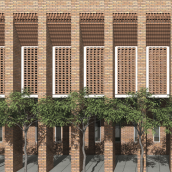Portuguese Secretary of State for Foreign Affairs and Co-operation visits the Aga Khan Academy Maputo
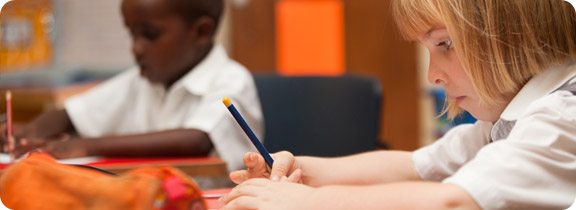
The Aga Khan Academy Curricular Strands
The Aga Khan Academy Curricular Strands are a unique part of the programme offered by the Aga Khan Academies. The strands are areas of learning aimed specifically at developing knowledge, skills and attitudes required by future leaders.
Our goal at the Academies is to develop young people who have strong local roots and are also globally minded. They should be able to become leaders in whichever fields they choose.
To help achieve this goal, we have identified five areas of learning, or strands, that we believe are important for our students. These are:
- Ethics
- Pluralism
- Economics for Development
- Cultures (including Muslim Cultures)
- Governance and Civil Society.
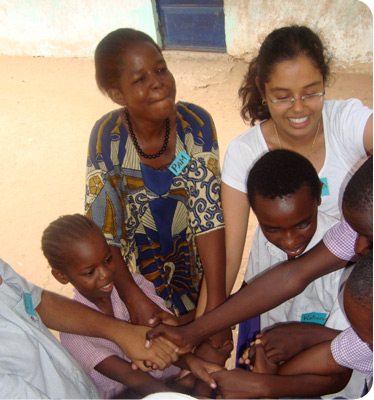 Implementing the Strands
Implementing the Strands
The strands are not taught as independent subjects. Instead, we weave them into the existing subject areas of the academic curriculum. They help inform the selection of content and themes for study. The strands also provide direction for school life outside the classroom in areas such as policy making, recruitment, student life and residential life.
Two of the strands, Ethics and Pluralism, help students develop values and dispositions required by ethical leaders. Our students learn about these areas in theory and are also encouraged to practice what they learn in their everyday lives.
Through the other three strands, our students learn about ideas that are important to the functioning of societies. In particular, they learn about how these ideas impact people’s lives in countries of the developing world. The knowledge they gain helps them understand key issues from both local and international perspectives.
The Strands in Practice
The strands were developed at the first Aga Khan Academy in Mombasa and are designed to be used in different cultural contexts. Teachers from the Aga Khan Academy, Dar-es-Salaam will help tailor the strands for the local environment in Tanzania.
Through the strands, our students develop attitudes and values that will help them throughout their lives. They also gain knowledge and understanding that will allow them to contribute positively to their societies in the future.
For more information on the educational programme offered at the Aga Khan Academy, Dar-es-Salaam, please visit the Academic Programme page.
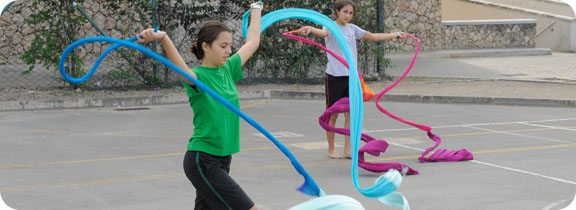
Aga Khan Curricular Strands
The Aga Khan Curricular Strands (AK Strands) are a unique part of the programme offered by the Aga Khan Academies. The AK Strands are areas of learning aimed specifically at developing knowledge, skills and attitudes required by future leaders.
Our goal at the Academies is to develop young people who have strong local roots and are also globally minded. They should be able to become leaders in whichever fields they choose.
To help achieve this goal, we have identified five areas of learning, the Aga Khan Curricular Strands, that we believe are important for our students. These are:
- Ethics
- Pluralism
- Cultures (with an emphasis on Muslim civilisations)
- Governance and Civil Society
- Economics for Development
Implementing the AK Strands
The Aga Khan Curricular Strands are not taught as independent subjects. Instead, we weave them into the existing subject areas of the academic curriculum. They help inform the selection of content and themes for study. The AK Strands also provide direction for school life outside the classroom in areas such as policy making, recruitment, student life and residential life.
Two of the AK Strands, Ethics and Pluralism, help students develop values and dispositions required by ethical leaders. Our students learn about these areas in theory and are also encouraged to practice what they learn in their everyday lives.
Through the other three AK Strands, our students learn about ideas that are important to the functioning of societies. In particular, they learn about how these ideas impact people’s lives in countries of the developing world. The knowledge they gain helps them understand key issues from both local and international perspectives.
The AK Strands in practice
The Aga Khan Curricular Strands have been developed and tested over several years at the Aga Khan Academy Mombasa. This has led to new ideas and creative methods of teaching.
For example, teachers in different departments are using the AK Strands to collaborate in interesting ways. In one project, year 7 students worked on a unit that related to Governance and Civil Society in both humanities and English. They linked their theoretical understanding of authority structures to their study of the novel, The Giver.
They looked at questions of governance, freedom of choice, security and related ethical questions through the lenses of both subject areas. This allowed for a unique learning experience that was both broad and deep.
Through the Aga Khan Curricular Strands, our students develop attitudes and values that will help them throughout their lives. They also gain knowledge and understanding that will allow them to contribute positively to their societies in the future.
For more information on the educational programme offered at the Aga Khan Academy Mombasa please visit the Academic Programme page.
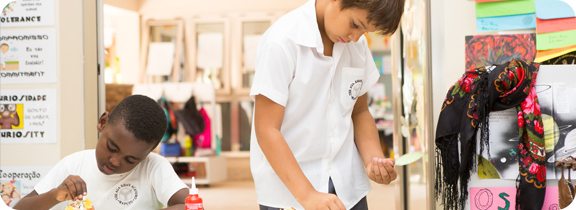
Aga Khan Curricular Strands
The Aga Khan Curricular Strands (AK Strands) are a unique part of the programme offered by the Aga Khan Academies. The AK Strands are areas of learning aimed specifically at developing knowledge, skills and attitudes required by future leaders.
Our goal at the Academies is to develop young people who have strong local roots and are also globally minded. They should be able to become leaders in whichever fields they choose.
To help achieve this goal, we have identified five areas of learning, the Aga Khan Curricular Strands, that we believe are important for our students. These are:
- Ethics
- Pluralism
- Cultures (with an emphasis on Muslim civilisations)
- Governance and Civil Society
- Economics for Development.
Implementing the AK Strands
The Aga Khan Curricular Strands are not taught as independent subjects. Instead, we weave them into the existing subject areas of the academic curriculum. They help inform the selection of content and themes for study. The AK Strands also provide direction for school life outside the classroom in areas such as policy making, recruitment, student life and residential life.
Two of the AK Strands, Ethics and Pluralism, help students develop values and dispositions required by ethical leaders. Our students learn about these areas in theory and are also encouraged to practice what they learn in their everyday lives.
Through the other three AK Strands, our students learn about ideas that are important to the functioning of societies. In particular, they learn about how these ideas impact people’s lives in countries of the developing world. The knowledge they gain helps them understand key issues from both local and international perspectives.
The AK Strands in practice
The Aga Khan Curricular Strands were developed at the first Aga Khan Academy in Mombasa and are designed to be used in different cultural contexts. Teachers from the Aga Khan Academy Maputo help tailor the AK Strands for the local environment in Mozambique.
Through the Aga Khan Curricular Strands, our students develop attitudes and values that will help them throughout their lives. They also gain knowledge and understanding that will allow them to contribute positively to their societies in the future.
For more information on the educational programme offered at the Aga Khan Academy Maputo, please visit the Academic Programme page.
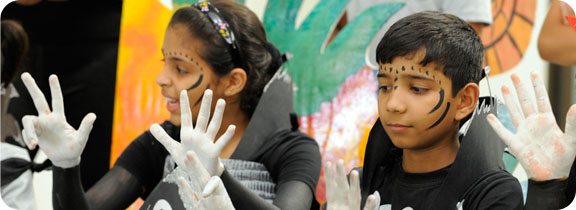
What Makes Us Unique
The Aga Khan Academies are an integrated network of about 18 residential schools in 14 countries in Africa, South and Central Asia, and the Middle East. They are dedicated to expanding access to the highest standard of education for exceptional young men and women, regardless of their ability to pay.
The Academies are more than just residential schools that strive to give their students a sound academic foundation. Each school emphasises the importance of academic excellence while instilling in students a sense of civic responsibility, leadership skills, and the desire, ability, and commitment to give back to their communities locally and globally.
The Academies are grounded in an educational approach that measures success not just by academic achievement, but by how students apply what they know to make the world a better place.
Students receive a grounding in ethics and also develop openness towards difference and acceptance of pluralism by living in diverse communities. As the network of Academies develops, both students and teachers will participate in visits and exchanges to Academies in other countries and regions.
Aims of the Academies programme
Our programme aims to:
- build inquiring, tolerant and creative minds
- empower gifted individuals, including girls, to innovate and lead
- over time, educate a cohort of well-trained local leaders with a sound ethical outlook and great intellectual capacity
- establish a global learning community across diverse geographic, social, economic, religious and tribal boundaries by providing needs-blind and merit-based admissions
- develop highly trained and effective educators
- positively influence education broadly across the targeted regions of the world, with measurable impact.
“The Aga Khan Academies aim to create ethical leaders with a strong sense of civic responsibility who will go on to the best universities in the world, pursue careers of their choice and…become leaders in the governments and the institutions of civil society in their own countries, in international organisations and in all those institutions, academic, economic and artistic that create positive change in our world.”
Embedded in our programme, the Aga Khan Curricular Strands (AK Strands) aim to strengthen understandings and outlooks needed by leaders of the future.
They encompass five critical areas of study:
- Ethics
- Pluralism
- Cultures (with an emphasis on Muslim civilisations)
- Governance and Civil Society
- Economics for Development.
The AK Strands examine issues of global importance and are also tailored to the cultural context of each Academy. This allows students to engage with international issues and challenges while remaining strongly grounded in their local context.
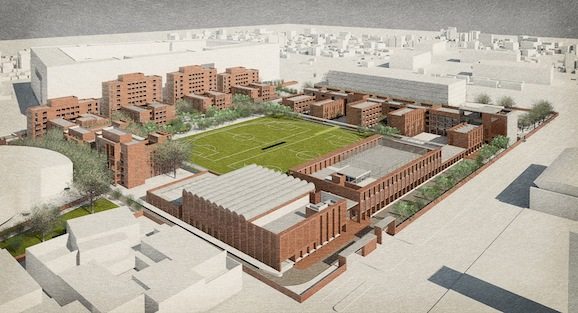
The Aga Khan Academy Dhaka
“This new Academy will be an important node in a network of 18 schools throughout the developing world, providing world class education for young men and women from all backgrounds, irrespective of ability to pay. It will be a remarkable place to go to school.”
His Highness the Aga Khan, Dhaka, Bangladesh, 20 May 2008
Introduction
The award-winning Aga Khan Academy Dhaka represents a significant investment in education by the Aga Khan Development Network for the benefit of Bangladesh. It will become a new national asset for the whole country – and for its broad educational community.
This not-for-profit school will be part of an integrated network of Aga Khan Academies located across 14 countries. The Academy is being established to provide exceptional students with an outstanding education to prepare them for leadership roles in Bangladesh and across the world. Students are selected based on merit, regardless of socio-economic background, gender, race or religion. This ensures that talented students from all sectors of Bangladeshi society can access a world-class education.
Through its Professional Development Centre (PDC), the Academy will also act as a regional hub for academic innovation and excellence. The PDC is dedicated to training new teachers to the highest standards while offering veteran teachers the opportunity to stay on the cutting edge of education through research and practice. This expertise is then shared to enhance teaching and learning at government and other schools.
Award-Winning Design
The Aga Khan Academy will be located on a 20-acre plot in Bashundara, Dhaka and will enrol 750 students (K–12) with a capacity to expand to 1,200. Residential facilities will be provided for students and staff to allow for wide participation and enable a diverse learning community. The school has been designed by renowned international architects to ensure the best possible educational experience in a physical environment that resonates with local Bangladeshi culture and architectural traditions.
The design for the Aga Khan Academy Dhaka received the award for best ‘Future Education’ project at the World Architecture Festival 2017, held on 15-17 November in Berlin, Germany. The award recognises the excellence of the school’s design as well as the project’s intention to generate positive social impact, which arises from the mission and values of the Aga Khan Academies and the wider Aga Khan Development Network (AKDN). The vision of the Academies is to develop future leaders with the skills and knowledge to positively support development in their own societies.
Construction of the Academy begun in 2018, with classes for students planned to start in 2020.
Educating Future Leaders
The Aga Khan Academy in Dhaka will develop leaders with a pluralistic sensibility – individuals who are proudly Bangladeshi yet also connected to the larger, cosmopolitan world. The Academies programme, which is based on the highly regarded International Baccalaureate (IB) curriculum, prepares students to succeed in a globally competitive world while also connecting them to their own language, literature, history and heritage. As they grow to take on leadership roles, this education uniquely prepares them to address the issues facing their communities with solutions that draw on global best practices and are appropriate to the local context. As language is essential to leadership, the Aga Khan Academy will provide bilingual education in English and Bangla, ensuring that students maintain strong ties to their roots. Service learning projects also cultivate the ethic of serving one’s community. In helping their neighboring communities, students are exposed to the challenges they face and learn to come up with contextually appropriate solutions.
Global Linkages
The Aga Khan Academy Dhaka will be the fourth school in a planned network of 18 campuses in Africa, South and Central Asia, and the Middle East, following Mombasa (Kenya), Hyderabad (India) and Maputo (Mozambique). Academy teachers and students will be able to collaborate across this network via technology to share experiences with others from different cultures. Teacher exchanges between schools provide exposure to different learning environments and opportunities to share best practices with colleagues. Student exchanges between schools are also planned to allow them to experience another culture first hand and further their experience of living in a pluralistic world.
International Partners
Education at an Aga Khan Academy is enriched by unique academic and co-curricular partnerships. The Academies work closely with AKDN agencies across many areas including for curricular innovation and to offer students in-depth service learning and internship experiences. Partnerships with internationally renowned institutions contribute to the quality of the Academies’ curriculum and professional development programmes, and ensure that the Academies maintain and enhance their international standing. Partners include the International Baccalaureate, the University of British Columbia, Concordia University, the Government of Ontario (Canada) and Microsoft, with the Academies in Mombasa and Hyderabad having both been recognised as Microsoft Showcase Schools.
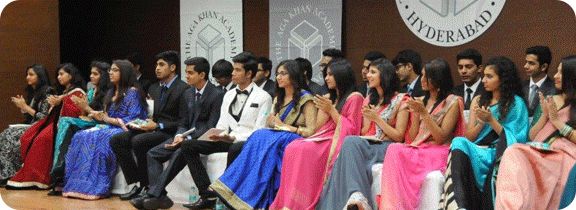
International Baccalaureate
The International Baccalaureate (IB) is a non-profit educational foundation, motivated by its mission to create a better world through education. IB programmes for students aged 3 to 19 help develop their intellectual, personal, emotional and social skills to live, learn and work in a rapidly globalising world.
The Aga Khan Academy Hyderabad has been authorised as an IB World School offering the IB Primary Years, Middle Years and Diploma Programmes.
IB World Schools share a common philosophy – a commitment to improve the teaching and learning of a diverse and inclusive community of students by delivering challenging, high quality programmes of international education that share a powerful vision.
Aims of the IB programme
Founded in 1968, the International Baccalureate currently works with schools in 144 countries to develop and offer their programmes to over one million students.
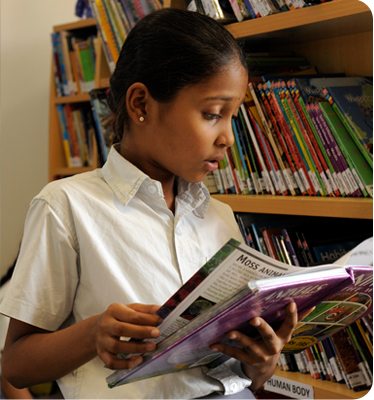 The IB mission statement declares:
The IB mission statement declares:
"The International Baccalaureate aims to develop inquiring, knowledgeable and caring young people who help to create a better and more peaceful world through intercultural understanding and respect. To this end the organisation works with schools, governments and international organisations to develop challenging programmes of international education and rigorous assessment. These programmes encourage students across the world to become active, compassionate and lifelong learners who understand that other people, with their differences, can also be right."
Primary Years Programme
The Primary Years Programme (PYP) at the Academy, for students aged 6–10, focuses on the development of the whole child, addressing social, physical, emotional and cultural needs, while giving students a strong foundation in all of the major areas of knowledge. Through the PYP, children become aware of and sensitive to the points of view of people in other parts of the world.
Middle Years Programme
The Middle Years Programme (MYP), for students aged 11–16, integrates the study of all the major disciplines, including languages, sciences, literature and the social sciences, mathematics, arts, technology and physical education. The MYP normally includes a service component designed to encourage students to become involved with their communities.
Diploma Programme
The Diploma Programme (DP), for students aged 16–19, is a two-year course of study that prepares students for university. All DP students study languages, a social science, an experimental science, mathematics and, usually, an arts subject.
At the same time as it provides a form of academic passport, the DP generally fulfils the requirements of a student's national education system. Each student's performance is evaluated by independent examiners and measured by his or her levels of knowledge and skills relative to set standards applied to all schools.
For further information about the International Baccalaureate and its programmes, please visit the IB website.
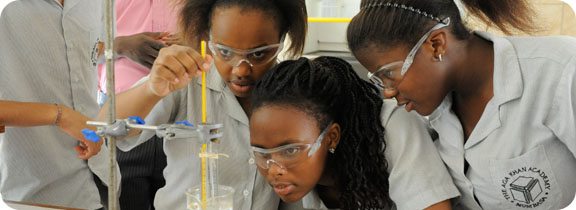
International Baccalaureate
The Aga Khan Academy Mombasa follows the principles of the International Baccalaureate (IB) and is an authorised IB World School.
The International Baccalaureate is a non-profit educational foundation, motivated by its mission to create a better world through education.
The three IB programmes offered at the Academy help develop the intellectual, personal, emotional and social skills to live, learn and work in a rapidly globalising world.
The three programmes are:
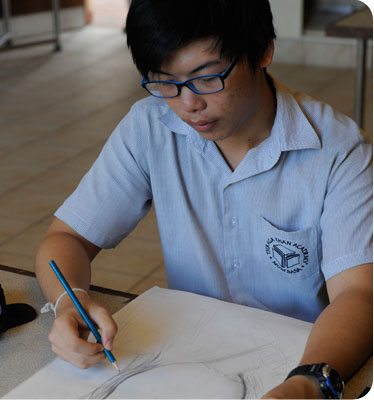
Primary Years Programme
The Primary Years Programme (PYP) at the Academy, for students aged 6–10, focuses on the development of the whole child, addressing social, physical, emotional, and cultural needs, while giving students a strong foundation in all of the major areas of knowledge. Through the PYP, children become aware of and sensitive to the points of view of people in other parts of the world.
Middle Years Programme
The Middle Years Programme (MYP), for students aged 11–16, integrates the study of all the major disciplines, including languages, sciences, literature and the social sciences, mathematics, arts, technology and physical education. The MYP normally includes a service component designed to encourage students to become involved with their communities.
Diploma Programme
The Diploma Programme (DP), for students aged 16–19, is a two-year course of study that prepares students for university. All DP students study languages, a social science, an experimental science, mathematics and, usually, an arts subject.
At the same time as it provides a form of academic passport, the DP generally fulfils the requirements of a student's national education system. Each student's performance is evaluated by independent examiners and measured by his or her levels of knowledge and skills relative to set standards applied to all schools.
Aims of the IB programme
Founded in 1968, the International Baccalureate currently works with 3,423 schools in 141 countries to develop and offer their programmes to over one million students.
Their mission statement declares: "The International Baccalaureate aims to develop inquiring, knowledgeable and caring young people who help to create a better and more peaceful world through intercultural understanding and respect."
"To this end the organisation works with schools, governments and international organisations to develop challenging programmes of international education and rigorous assessment. These programmes encourage students across the world to become active, compassionate and lifelong learners who understand that other people, with their differences, can also be right."
The IB is more than its educational programmes and certificates. At heart they are motivated by a mission to create a better world through education.
They value their hard-earned reputation for quality, for high standards and for pedagogical leadership.
They achieve their goals by working with partners and by actively involving stakeholders, particularly teachers.
For further information please visit the IB website.

International Baccalaureate
The Aga Khan Academy Maputo follows the principles of the International Baccalaureate (IB) and is preparing to become an authorised IB World School.
The International Baccalaureate is a non-profit educational foundation, motivated by its mission to create a better world through education.
The three IB programmes for students aged 3 to 19 help develop the intellectual, personal, emotional and social skills to live, learn and work in a rapidly globalising world.
Aims of the IB Programme
Founded in 1968, the International Baccalureate currently works with 3,423 schools in 141 countries to develop and offer their programmes to over one million students.
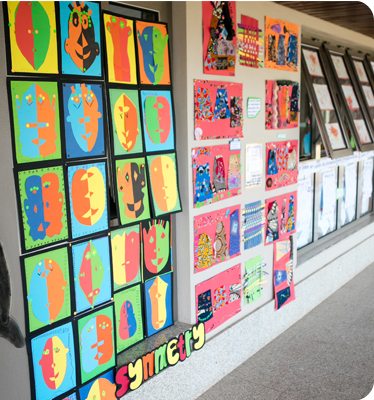 Their mission statement declares: "The International Baccalaureate aims to develop inquiring, knowledgeable and caring young people who help to create a better and more peaceful world through intercultural understanding and respect."
Their mission statement declares: "The International Baccalaureate aims to develop inquiring, knowledgeable and caring young people who help to create a better and more peaceful world through intercultural understanding and respect."
"To this end the organisation works with schools, governments and international organisations to develop challenging programmes of international education and rigorous assessment. These programmes encourage students across the world to become active, compassionate and lifelong learners who understand that other people, with their differences, can also be right."
The IB is more than its educational programmes and certificates. At heart they are motivated by a mission to create a better world through education.
They value their hard-earned reputation for quality, for high standards and for pedagogical leadership. They achieve their goals by working with partners and by actively involving stakeholders, particularly teachers.
The three programmes are:
Primary Years Programme
The Primary Years Programme (PYP) focuses on the development of the whole child, addressing social, physical, emotional and cultural needs, while giving students a strong foundation in all of the major areas of knowledge.
Through the PYP, children become aware of and sensitive to the points of view of people in other parts of the world.
Middle Years Programme
The Middle Years Programme (MYP) integrates the study of all the major disciplines, including languages, sciences, literature and the social sciences, mathematics, arts, technology and physical education.
The MYP normally includes a service component designed to encourage students to become involved with their communities.
Diploma Programme
The Diploma Programme (DP) is a two-year course of study that prepares students for university. All DP students study languages, a social science, an experimental science, mathematics and, usually, an arts subject.
At the same time as it provides a form of academic passport, the DP generally fulfils the requirements of a student's national education system. Each student's performance is evaluated by independent examiners and measured by his or her levels of knowledge and skills relative to set standards applied to all schools.
For further information please visit the IB website.
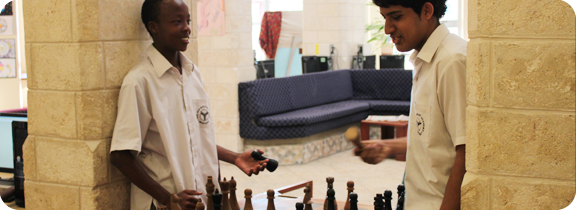
International Baccalaureate
The Aga Khan Academy, Dar-es-Salaam follows the principles of the International Baccalaureate (IB) and is preparing to become an authorised IB World School.
The International Baccalaureate (IB) is a non-profit educational foundation, motivated by its mission to create a better world through education.
The three IB programmes for students aged 3 to 19 help develop the intellectual, personal, emotional and social skills to live, learn and work in a rapidly globalising world.
Aims of the IB Programme
Founded in 1968, the International Baccalureate currently works with 3,423 schools in 141 countries to develop and offer their programmes to over one million students.
Their mission statement declares: "The International Baccalaureate aims to develop inquiring, knowledgeable and caring young people who help to create a better and more peaceful world through intercultural understanding and respect.
"To this end the organisation works with schools, governments and international organizations to develop challenging programmes of international education and rigorous assessment. These programmes encourage students across the world to become active, compassionate and lifelong learners who understand that other people, with their differences, can also be right."
The IB is more than its educational programmes and certificates. At heart they are motivated by a mission to create a better world through education.
They value their hard-earned reputation for quality, for high standards and for pedagogical leadership. They achieve their goals by working with partners and by actively involving stakeholders, particularly teachers.
The three programmes are:
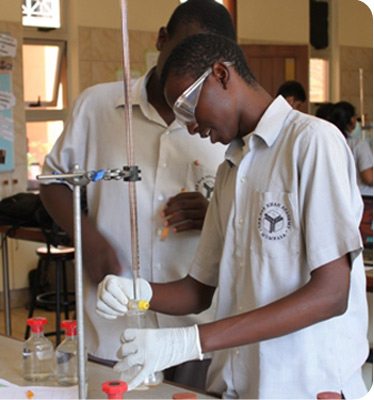 Primary Years Programme
Primary Years Programme
The Primary Years Programme (PYP) focuses on the development of the whole child, addressing social, physical, emotional and cultural needs, while giving students a strong foundation in all of the major areas of knowledge.
Through the PYP, children become aware of and sensitive to the points of view of people in other parts of the world.
Middle Years Programme
The Middle Years Programme (MYP) integrates the study of all the major disciplines, including languages, sciences, literature and the social sciences, mathematics, arts, technology and physical education.
The MYP normally includes a service component designed to encourage students to become involved with their communities.
Diploma Programme
The Diploma Programme (DP) is a two-year course of study that prepares students for university. All DP students study languages, a social science, an experimental science, mathematics and, usually, an arts subject.
At the same time as it provides a form of academic passport, the DP generally fulfils the requirements of a student's national education system. Each student's performance is evaluated by independent examiners and measured by his or her levels of knowledge and skills relative to set standards applied to all schools.
For further information please visit the website of the International Baccalaureate at http://www.ibo.org.
